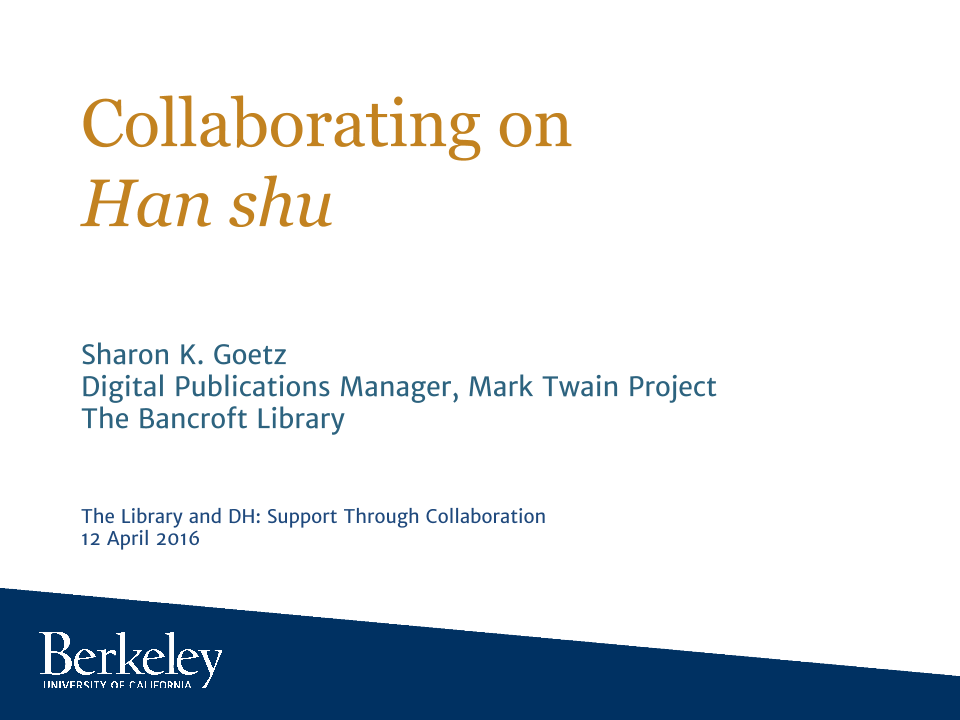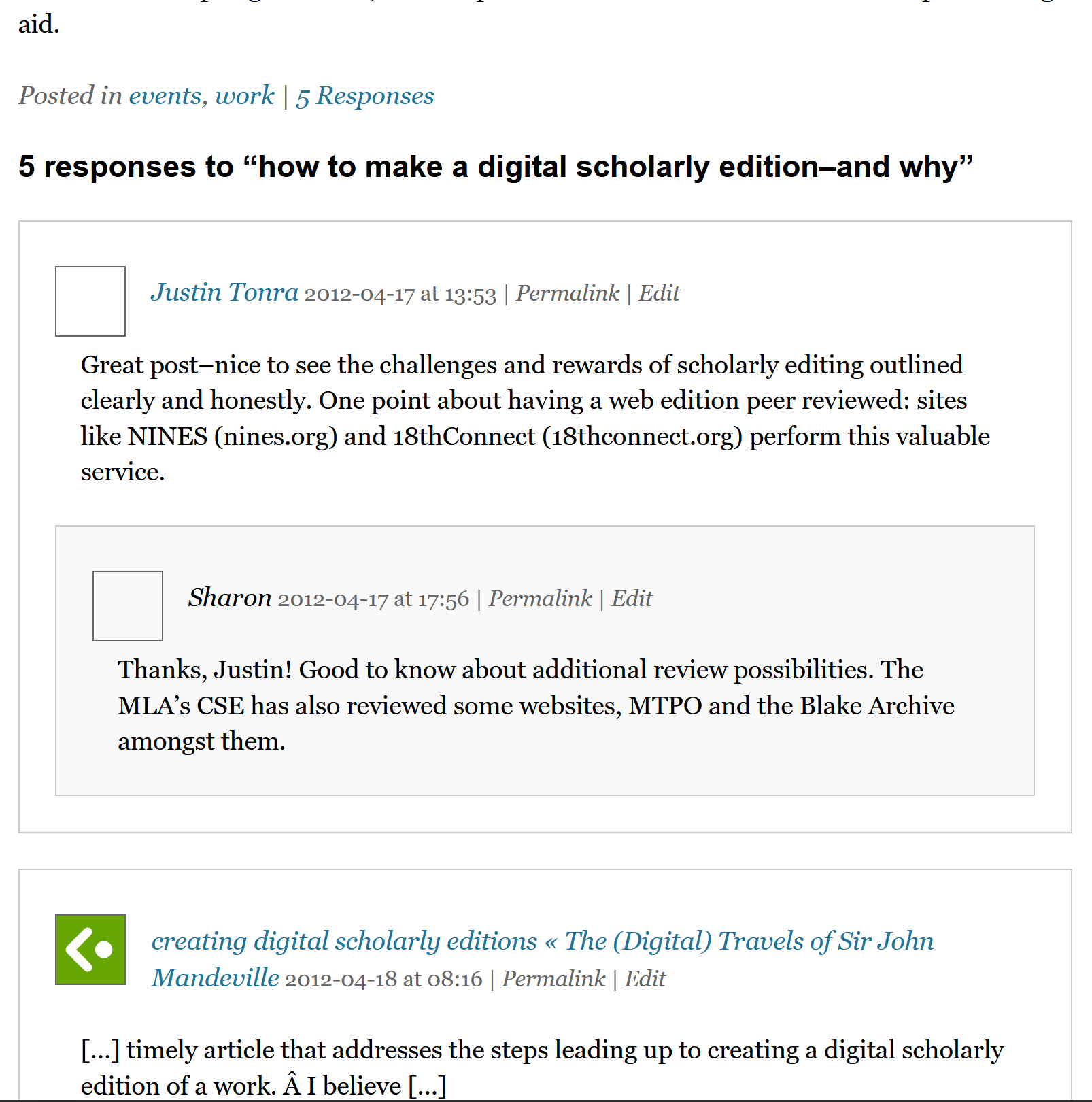|
|
2025-08-16
|
wordpress then, quarto now
|
|
|
2022-06-15
|
that feeling when
|
|
|
2021-11-10
|
a small contribution
|
|
|
2020-10-21
|
Andreas Burkard, Monitoring Systems for Checking Websites on Accessibility
|
|
|
2020-10-02
|
Library Coffee Chat: Supporting Students with Remote Learning; Preservation Overview
|
|
|
2019-05-31
|
cho shim
|
|
|
2019-05-12
|
thought and memory
|
|
|
2019-04-03
|
ish
|
|
|
2019-03-03
|
being contingent: a timeline
|
|
|
2019-02-03
|
when life hands you lemons
|
|
|
2018-12-20
|
two by Casker
|
|
|
2018-12-06
|
invisible ink siphoned through one last straw
|
|
|
2018-12-01
|
rusting connectivity
|
|
|
2018-10-14
|
alles wird gut
|
|
|
2017-12-17
|
an old storify post, archived
|
|
|
2016-06-06
|
here a fitt ends
|
|

|
2016-04-12
|
Collaborating on Han shu (漢書)
|
|
|
2012-07-06
|
a little light javascript
|
|
|
2012-06-17
|
abstract for “Textual Portability”
|
|
|
2012-06-17
|
status: mid-june 2012
|
|
|
2012-05-05
|
select (dissertation) bibliography
|
|
|
2012-04-24
|
manuscripts containing Li Rei de Engletere
|
|

|
2012-04-14
|
how to make a digital scholarly edition–and why
|
|
|
2012-04-14
|
some tools of the trade
|
|
|
2011-10-13
|
TEI 2011 Tech Corner
|
|
|
2011-10-12
|
TEI 2011 opening keynote: Edward Vanhoutte
|
|
|
2011-10-12
|
past things
|
|
|
2011-09-26
|
Gods and Monsters 1
|
|
|
2011-09-26
|
Gods and Monsters 2
|
|
|
2011-09-26
|
Arthur, King of the Britons?
|
|
|
2011-09-26
|
Think about the Future
|
|
|
2011-09-26
|
Accidental Tourists in Speculative Fiction
|
|
|
2011-06-22
|
SES-36: The “#alt-ac” Track
|
|
|
2011-06-22
|
SES-29: Integrating Digital Papyrology
|
|
|
2011-06-20
|
SES-08: Long papers: ID 196, 315, 346
|
|
|
2010-05-31
|
Mark Twain’s “Great” Works
|
|
|
2010-05-31
|
Asian American Literature
|
|
|
2010-05-31
|
The Varieties of Digital Experience
|
|
|
2010-05-31
|
MT: The Perils of Biography and Anthology
|
|
|
2009-10-08
|
The Future of Electronic Reading
|
|
![]()
|
2009-10-08
|
What Readers Want (from Ebooks)
|
|
|
2009-10-08
|
Ebook Pricing
|
|
|
2009-10-03
|
passing this way and that
|
|
|
2009-08-28
|
The Google Books Settlement and Information Quality
|
|
|
2009-08-28
|
Privacy and the Google Books Settlement
|
|
|
2009-08-28
|
Data Mining and Non-consumptive Use
|
|
|
2009-08-28
|
Google Books Settlement symposium, 2009
|
|
![]()
|
2009-05-06
|
Kalamazoo roundtable paperlet
|
|
![]()
|
2008-03-31
|
referentiality from a reader’s perspective
|
|
|
2008-01-25
|
blown away
|
|
|
2007-06-08
|
30: Interface and User Perspective
|
|
|
2007-06-07
|
14: “Done”: Finished Projects in the Digital Humanities
|
|
|
2007-06-07
|
25: Models and Tools
|
|
|
2007-06-07
|
7: Digital Humanities and the Solitary Scholar
|
|
|
2007-06-07
|
24: Representation and Analysis
|
|
|
2007-06-06
|
4: ADHO Panel
|
|
|
2007-06-06
|
18: Visualities 2
|
|
|
2007-06-06
|
2: Roundtable: Coalition of Digital Humanities Centers
|
|
|
2007-06-05
|
12: Interoperability of Metadata for . . .
|
|
|
2007-06-02
|
372: Weblogs and the Academy
|
|
|
2007-05-29
|
17: EMES 2
|
|
|
2007-05-24
|
114: Layamon’s Brut
|
|
|
2007-03-22
|
carthy’s gypsies
|
|
|
2007-02-06
|
boosting arts/humanities computing
|
|
|
2007-02-01
|
notes on events
|
|
|
2006-12-28
|
Saturday, 17:00
|
|
|
2006-11-08
|
Saturday, 14:00
|
|
|
2006-11-06
|
Saturday, 9:00
|
|
|
2006-11-03
|
Friday, 16:30
|
|
|
2006-11-01
|
Friday, 15:00
|
|
|
2006-10-28
|
Friday, 11:00
|
|
|
2006-10-28
|
Friday, 10:30
|
|
|
2006-10-28
|
Friday, 9:00
|
|
|
2006-03-23
|
how to replace a Palm Tungsten C battery
|